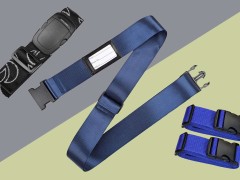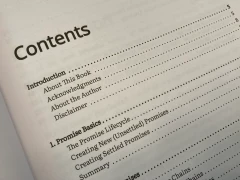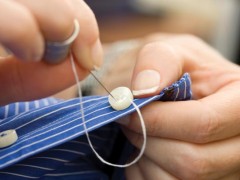forest [ˈfɔrist] n. 森林
【例】Are there any wild animals in the forest?
这片森林里有没有野生动物?
【扩】woods 树林
risk [risk] n. 危险,冒险
【派】risky 冒险的
【扩】peril 冒险,危险
【搭】take a risk 冒险
* * *
A: None would take the risk.
B: But I want to have a try.
A:谁也不愿冒此风险。
B:但是我想试一试。
* * *
picnic [ˈpiknik] n. 野餐
【扩】cookout 野餐
【搭】have a picnic 进行野餐
* * *
A: Is there anything else for our picnic?
B: We'd better get each of us a sun hat for the picnic in such a hot day.
A:野餐我们还需要买些什么?
B:天那么热,去野餐我们最好每个人都有一顶帽子。
* * *
edge [edʒ] n. 边缘
【扩】margin 边缘,岸
* * *
A: Wasn't that a great flick? I was on the edge of my seat through the whole movie.
B: Yes, it's the best movie I have ever seen.
A:那部片子是不是很棒?我从头到尾一口气都没松过。
B:是的,那是我看过的最棒的电影。
* * *
strap [stræp] n. 带,皮带
possession [pəˈzeʃən] n. 所有
【搭】in possession of 占有,控制
* * *
A: The house is in his possession.
B: I think he must be very rich.
A:那座房子为他所有。
B:我想他一定很富有。
* * *
breath [breθ] n. 呼吸
【扩】respiration 呼吸
【搭】take a breath 深深地吸一口气
* * *
A: How's your work these days?
B: I don't even have time to catch my breath.
A:这些天你的工作怎么样?
B:连喘口气的工夫都没有。
* * *
content [ˈkɔntent] n. (常用复数)内有的物品
mend [mend] v. 修理
* * *
A: Something is wrong with the fridge. Can you mend it?
B: Sure. When do you want it to be mended?
A:冰箱坏了,你会修吗?
B:当然可以。您想让我们什么时候修理?
noun [具体名词]森林,林区;(森林似的)一丛,一片;御猎场 - Parts of the forest are still dense and inaccessible.
verb [vi. 不及物动词]被森林覆盖,植林于 - We need to preserve the forest.
noun [抽象名词]危险,风险;危险的人(或事物),隐患;(按风险大小评估的)被保险对象,受贷者;(保险业承保的)险;金融风险 - There is no risk of contagion.
verb [vi. 不及物动词]使遭受(失去、毁坏或伤害的)危险;冒......的危险,担......的风险;冒险做,(明知结果而)大胆做 - You must be mad to risk it.
① n. 危险,风险
- Is there much risk of losing money in doing football pols?
- John took/ran the risk of damaging his bus and drove it into the back of the thieves’car. 约翰冒着撞坏他开的那辆公共汽车的危险把它撞在了小偷们的车的后尾上。
- John saved me at the risk of his own life. 约翰冒着生命危险救了我。
② vt. 冒……危险,使……遭受危险
- We’d better take a taxi.
- We can’t risk missing the plane.
- John risked his own life to save me.
noun [具体名词]野餐,野餐活动;野餐食物;<非正式>愉快事物,轻松事物 - We're going on a picnic tomorrow.
verb [vi. 不及物动词]参加野餐活动 - When people picnic somewhere, they have a picnic.
noun [具体名词]边,边缘;锋,刃;优势;影响力,奇特的品质;(声音里的)尖锐,怒气;(坏事的)边缘,临界点;棱 - The edge of something sharp such as a knife or an axe is its sharp or narrow side.
verb [vi. 不及物动词]缓慢地移动;给…加边;险胜;用球拍边击球;倾斜滑雪;修剪(草地边缘);使锐利,使尖锐 - If someone or something edges somewhere, they move very slowly in that direction.
noun [具体名词]带子,皮带;铁皮条,金属带,铰链片;鞭打(the strap);拉手吊带,拉手吊环 - Nancy gripped the strap of her beach bag.
verb [vi. 不及物动词](用带子)束住,捆绑;用绷带包扎(伤口);用皮鞭抽打,鞭打 - She strapped the baby seat into the car.
noun [抽象名词]<正式> 拥有,持有;个人财产,所有物;持有违禁物,私藏毒品(或武器);(对球的)控制,球权;进攻;领地,殖民地;鬼魂附体,着魔;(观点或情感的)支配,控制 - Your possessions are the things that you own or have with you at a particular time.
noun [专属名词]呼吸,气息;一次吸入的空气;(风或气流的)一丝,丝毫;微量,迹象;一瞬间 - His breath came in short pants.
- out of breath 上气不接下气
- waste one's breath 白费口舌
- in one breath 片刻, 转眼间
- He finished water in one breath. 他一口气把水喝完了.
- hold one's breath 屏 住 呼 吸
- bad breath 口 臭
- You have a bad breath. 你有口臭.
noun [专属名词]目录;所含物,容纳的东西 - Empty the contents of the pan into the sieve.
verb [vi. 不及物动词]使满意,使满足(content 的第三人称单数) - to make (oneself or another person) content or satisfied
- contents of the bag 包里的书
- More contents! (口语) 在吃饭时要求再加些饭菜时可以这样说.
content n. 内容(抽象)
- content of the text 文章的内容
verb [vt. 及物动词]缝补,修补;修理;愈合,痊愈;弥合(分歧),解决(争端);(给火)添燃料 - Men say that we are only good for cooking their meals and mending their socks.
noun [抽象名词]好转,复苏;修理过的地方,补丁 - More evidence that the economy was on the mend was needed.
| 英语短语 中文翻译 | 英文例句 中文翻译 |
|---|---|
| fix 修复,修理;解决 | I need to fix the leaky faucet in the kitchen. 我需要修理厨房里漏水的水龙头。 Can you help me fix this problem? 你能帮我解决这个问题吗? |
| mend 修补,缝补;改进 | She carefully mended the tear in her favorite jeans. 她小心翼翼地缝补了她最喜欢的牛仔裤上的破洞。 Their friendship began to mend after the misunderstanding. 误解之后,他们的友谊开始修复。 |
| repair 修理,修复;弥补 | The mechanic will repair the engine of my car. 机械师将修理我的汽车发动机。 We need to repair the damage caused by the storm. 我们需要修复风暴造成的损失。 |
| maintain 维持,保持;保养 | It's important to maintain a healthy diet. 保持健康的饮食很重要。 You should regularly maintain your car to prevent breakdowns. 你应该定期保养你的车,以防止故障。 |
| renovate 翻新,修缮(尤指建筑物) | They decided to renovate their old house to increase its value. 他们决定翻新旧房子以增加其价值。 |
| restore 恢复,复原;修复(艺术品、古迹等) | The painting was carefully restored to its original condition. 这幅画被小心地修复到它最初的状态。 The government is working to restore peace in the region. 政府正在努力恢复该地区的和平。 |
| overhaul 彻底检修,大修;全面改革 | The old machinery needs a complete overhaul. 这台旧机器需要一次彻底的检修。 The company decided to overhaul its entire marketing strategy. 公司决定彻底改革其整个营销策略。 |
| remedy 补救,纠正;治疗 | There are several ways to remedy this situation. 有几种方法可以补救这种情况。 She found a natural remedy for her cough. 她找到了一个治疗咳嗽的自然疗法。 |
| address 处理,解决(问题、情况) | We need to address the root causes of poverty. 我们需要解决贫困的根本原因。 The manager will address your concerns in the meeting. 经理将在会议中处理你的担忧。 |
| handle 处理,应对;操作 | She is very good at handling difficult customers. 她非常擅长处理难缠的顾客。 Please handle these fragile items with care. 请小心处理这些易碎物品。 |








